- Home
- Jr. Horatio Alger
The Telegraph Boy
The Telegraph Boy Read online
Produced by David Edwards, Mary Meehan and the OnlineDistributed Proofreading Team at https://www.pgdp.net (Thisfile was produced from scans of public domain materialproduced by Microsoft for their Live Search Books site.)
THE TELEGRAPH BOY.
BY HORATIO ALGER, JR.,
AUTHOR OF "RAGGED DICK SERIES," "LUCK AND PLUCK SERIES," "BRAVE AND BOLDSERIES," ETC., ETC.
HORATIO ALGER'S BOOKS FOR BOYS AND GIRLS.
THE JOHN C. WINSTON CO. PHILADELPHIA CHICAGO TORONTO
To THREE YOUNG FRIENDS, LORIN AND BEATRICE BERNHEIMER, AND FLORINE ARNOLD, This Story IS AFFECTIONATELY DEDICATED.
PREFACE.
The "Telegraph Boy" completes the series of sketches of street-life inNew York inaugurated eleven years since by the publication of "RaggedDick." The author has reason to feel gratified by the warm receptionaccorded by the public to these pictures of humble life in the greatmetropolis. He is even more gratified by the assurance that his laborshave awakened a philanthropic interest in the children whose strugglesand privations he has endeavored faithfully to describe. He feels it hisduty to state that there is no way in which these waifs can moreeffectually be assisted than by contributing to the funds of "TheChildren's Aid Society," whose wise and comprehensive plans for thebenefit of their young wards have already been crowned with abundantsuccess.
The class of boys described in the present volume was called intoexistence only a few years since, but they are already so numerous thatone can scarcely ride down town by any conveyance without having one fora fellow-passenger. Most of them reside with their parents and havecomfortable homes, but a few, like the hero of this story, are whollydependent on their own exertions for a livelihood. The variety oferrands on which they are employed, and their curious experiences, areby no means exaggerated in the present story. In its preparation theauthor has been assisted by an excellent sketch published perhaps a yearsince in the "New York Tribune."
HORATIO ALGER, JR. NEW YORK, Sept. 1, 1879.
THE TELEGRAPH BOY.
CHAPTER I.
A YOUNG CARPET-BAGGER.
"Twenty-five cents to begin the world with!" reflected Frank Kavanagh,drawing from his vest-pocket two ten-cent pieces of currency and anickel. "That isn't much, but it will have to do."
The speaker, a boy of fifteen, was sitting on a bench in City-Hall Park.He was apparently about fifteen years old, with a face not handsome, butfrank and good-humored, and an expression indicating an energetic andhopeful temperament. A small bundle, rolled up in a handkerchief,contained his surplus wardrobe. He had that day arrived in New York by aboat from Hartford, and meant to stay in the city if he could make aliving.
Next to him sat a man of thirty-five, shabbily dressed, who clearly wasnot a member of any temperance society, if an inflamed countenance andred nose may be trusted. Frank Kavanagh's display of money attracted hisattention, for, small as was the boy's capital, it was greater than hisown.
"Been long in the city, Johnny?" he inquired.
"I only arrived to-day," answered Frank. "My name isn't Johnny, though."
"It's immaterial. Johnny is a generic term," said the stranger. "Isuppose you have come here to make your fortune."
"I shall be satisfied with a living to begin with," said Frank.
"Where did you come from?"
"A few miles from Hartford."
"Got any relations there?"
"Yes,--an uncle and aunt."
"I suppose you were sorry to leave them."
"Not much. Uncle is a pretty good man, but he's fond of money, and auntis about as mean as they make 'em. They got tired of supporting me, andgave me money enough to get to New York."
"I suppose you have some left," said the stranger, persuasively.
"Twenty-five cents," answered Frank, laughing. "That isn't a very bigcapital to start on, is it?"
"Is that all you've got?" asked the shabbily dressed stranger, in a toneof disappointment.
"Every cent."
"I wish I had ten dollars to give you," said the stranger, thoughtfully.
"Thank you, sir; I wish you had," said Frank, his eyes resting on thedilapidated attire of his benevolent companion. Judging from that, hewas not surprised that ten dollars exceeded the charitable fund of thephilanthropist.
"My operations in Wall street have not been fortunate of late," resumedthe stranger; "and I am in consequence hard up."
"Do you do business in Wall street?" asked Frank, rather surprised.
"Sometimes," was the reply. "I have lost heavily of late in Erie andPacific Mail, but it is only temporary. I shall soon be on my feetagain."
"I hope so, sir," said Frank, politely.
"My career has been a chequered one," continued the stranger. "I, too,as a mere boy, came up from the country to make my fortune. I embarkedin trade, and was for a time successful. I resigned to get time to writea play,--a comedy in five acts."
Frank regarded his companion with heightened respect. He was a boy ofgood education, and the author of a play in his eyes was a man ofgenius.
"Was it played?" he inquired.
"No; Wallack said it had too many difficult characters for his company,and the rest of the managers kept putting me off, while they wereproducing inferior plays. The American public will never know what theyhave lost. But, enough of this. Sometime I will read you the'Mother-in-law,' if you like. Have you had dinner?"
"No," answered Frank. "Do you know where I can dine cheap?" heinquired.
"Yes," answered the stranger. "Once I boarded at the Astor House, butnow I am forced, by dire necessity, to frequent cheap restaurants.Follow me."
"What is your name, sir?" asked Frank, as he rose from the bench.
"Montagu Percy," was the reply. "Sorry I haven't my card-case with me,or I would hand you my address. I think you said your name was notJohnny."
"My name is Frank Kavanagh."
"A very good name. 'What's in a name?' as Shakespeare says."
As the oddly assorted pair crossed the street, and walked down Nassaustreet, they attracted the attention of some of the Arabs who werelounging about Printing-House square.
"I say, country, is that your long-lost uncle?" asked a boot-black.
"No, it isn't," answered Frank, shortly.
Though he was willing to avail himself of Mr. Percy's guidance, he wasnot ambitious of being regarded as his nephew.
"Heed not their ribald scoffs," said Montagu Percy, loftily. "Theirwords pass by me 'like the idle wind,' which I regard not."
"Who painted your nose, mister?" asked another boy, of course addressingFrank's companion.
"I will hand you over to the next policeman," exclaimed Percy, angrily.
"Look out he don't haul you in, instead," retorted the boy.
Montagu Percy made a motion to pursue his tormentors, but desisted.
"They are beneath contempt," he said. "It is ever the lot of genius tobe railed at by the ignorant and ignoble. They referred to my nose beingred, but mistook the cause. It is a cutaneous eruption,--the result oferysipelas."
"Is it?" asked Frank, rather mystified.
"I am not a drinking man--that is, I indulge myself but rarely. But herewe are."
So saying he plunged down some steps into a basement, Frank followinghim. Our hero found himself in a dirty apartment, provided with a bar,over which was a placard, inscribed:--
"FREE LUNCH."
"How much money have you got, Frank?" inquired Montagu Percy.
"Twenty-five cents."
"Lunch at this establishment is free," said Montagu; "but you areexpected to order some drink. What will you have?"
"I don't care for any drink except a glass of water."
"All right; I will order for you, as the rules of the establishmentrequire it; but I will drink your glass myself. Eat whatever you like."
Frank took a sandwich from a plate on the counter and ate it withrelish, for he was hungry. Meanwhile his companion emptied the twoglasses, and ordered another.
"Can you pay for these drinks?" asked the bar-tender, suspiciously.
"Sir, I never order what I cannot pay for."
"I don't know about that. You've been in here and taken lunch more thanonce without drinking anything."
"It may be so. I will make up for it now. Another glass, please."
"First pay for what you have already drunk."
"Frank, hand me your money," said Montagu.
Frank incautiously handed him his small stock of money, which he sawinstantly transferred to the bar-tender.
"That is right, I believe," said Montagu Percy.
The bar-keeper nodded, and Percy, transferring his attention to the freelunch, stowed away a large amount.
Frank observed with some uneasiness the transfer of his entire cashcapital to the bar-tender; but concluded that Mr. Percy would refund apart after they went out. As they reached the street he broached thesubject.
"I didn't agree to pay for both dinners," he said, uneasily.
"Of course not. It will be my treat next time. That will be fair, won'tit?"
"But I would rather you would give me back a part of my money. I may notsee you again."
"I will be in the Park to-morrow at one o'clock."
"Give me back ten cents, then," said Frank, uneasily. "That was all themoney I had."
"I am really sorry, but I haven't a penny about me. I'll make it rightto-morrow. Good-day, my young friend. Be virtuous and you will behappy."
Frank looked after the shabby figure ruefully. He felt that he had beentaken in and done for. His small capital had vanished, and he was adriftin the streets of a strange city without a penny.
CHAPTER II.
DICK RAFFERTY.
"I've been a fool," said Frank to himself, in genuine mortification, ashe realized how easily he had permitted himself to be duped. "I ought tohave stayed in the country."
Even a small sum of money imparts to its possessor a feeling ofindependence, but one who is quite penniless feels helpless andapprehensive. Frank was unable even to purchase an apple from the snuffyold apple-woman who presided over the stand near by.
"What am I going to do?" he asked himself, soberly.
"What has become of your uncle?" asked a boot-black.
Looking up, Frank recognized one of those who had saluted Percy andhimself on their way to the restaurant.
"He isn't my uncle," he replied, rather resentfully.
"You never saw him before, did you?" continued the boy.
"No, I didn't."
"That's what I thought."
There was something significant in the young Arab's tone, which ledFrank to inquire, "Do you know him?"
"Yes, he's a dead-beat."
"A what?"
"A dead-beat. Don't you understand English?"
"He told me that he did business on Wall street."
The boot-black shrieked with laughter.
"He do business on Wall street!" he repeated. "You're jolly green, youare!"
Frank was inclined to be angry, but he had the good sense to see thathis new friend was right. So he said good-humoredly, "I suppose I am.You see I am not used to the city."
"It's just such fellows as you he gets hold of," continued theboot-black. "Didn't he make you treat?"
"I may as well confess it," thought Frank. "This boy may help me withadvice."
"Yes," he said aloud. "I hadn't but twenty-five cents, and he made mespend it all. I haven't a cent left."
"Whew!" ejaculated the other boy. "You're beginnin' business on a smallcapital."
"That's so," said Frank. "Do you know any way I can earn money?"
Dick Rafferty was a good-natured boy, although rough, and now that Frankhad appealed to him for advice he felt willing to help him, if he could.
"What can you do?" he asked, in a business-like tone. "Have you everworked?"
"Yes," answered Frank.
"What can you do?"
"I can milk cows, hoe corn and potatoes, ride horse to plough, and--"
"Hold up!" said Dick. "All them things aint goin' to do you no good inNew York. People don't keep cows as a reg'lar thing here."
"Of course I know that."
"And there aint much room for plantin' corn and potatoes. Maybe youcould get a job over in Jersey."
"I'd rather stay in New York. I can do something here."
"Can you black boots, or sell papers?"
"I can learn."
"You need money to set up in either of them lines," said Dick Rafferty.
"Would twenty-five cents have been enough?" asked Frank.
"You could have bought some evening papers with that."
"I wish somebody would lend me some money," said Frank; "I'd pay it backas soon as I'd sold my papers. I was a fool to let that fellow swindleme."
"That's so," assented Dick; "but it's no good thinkin' of that now. I'dlend you the money myself, if I had it; but I've run out my account atthe Park Bank, and can't spare the money just at present."
"How long have you been in business?" asked Frank.
"Ever since I was eight years old; and I'm goin' on fifteen now."
"You went to work early."
"Yes, I had to. Father and mother both died, and I was left to take careof myself."
"You took care of yourself when you were only eight years old?" askedFrank, in surprise.
"Yes."
"Then I ought to make a living, for I am fifteen,--a year older than youare now."
"Oh, you'll get along when you get started," said Dick, encouragingly."There's lots of things to do."
"Is there anything to do that doesn't require any capital?" inquiredFrank, anxiously.
"Yes, you can smash baggage."
"Will people pay for that?" asked Frank, with a smile.
"Of course they will. You jest hang round the ferries and steamboatlandin's, and when a chap comes by with a valise or carpet-bag, you jestoffer to carry it, that's all."
"Is that what you call smashing baggage?"
"Of course. What did you think it was?"
Frank evaded answering, not caring to display his country ignorance.
"Do you think I can get a chance to do that?" he asked.
"You can try it and see."
"I came in by the Hartford boat myself, to-day," said Frank. "If I'dthought of it, I would have begun at once."
"Only you wouldn't have knowed the way anywhere, and if a gentlemanasked you to carry his valise to any hotel you'd have had to ask whereit was."
"So I should," Frank admitted.
"I'll show you round a little, if you want me to," said Dick. "I shan'thave anything to do for an hour or two."
"I wish you would."
So the two boys walked about in the lower part of the city, Dickpointing out hotels, public buildings, and prominent streets. Frank hada retentive memory, and stored away the information carefully. Pennilessas he was, he was excited and exhilarated by the scene of activity inwhich he was moving, and was glad he was going to live in it, or toattempt doing so.
"When I am used to it I shall like it much better than the country," hesaid to Dick. "Don't you?"
"I don't know about that," was the reply. "Sometimes I think I'll goWest;--a lot of boys that I know have gone there."
"Won't it take a good deal of money to go?" asked Frank.
"Oh, there's a society that pays boys' expenses, and finds 'em nicehomes with the farmers. Tom Harrison, one of my friends, went out sixweeks ago, and he writes me that it's bully. He's gone to some town inKansas."
"That's a good way off."
"I wouldn't mind that. I'd like ridin'
in the cars."
"It would be something new to you; but I've lived in the country all mylife, I'd rather stay here awhile."
"It's just the way a feller feels," said Dick philosophically. "I'vebummed around so much I'd like a good, stiddy home, with three squaremeals a day and a good bed to sleep on."
"Can't you get that here?" asked Frank.
"Not stiddy. Sometimes I don't get but one square meal a day."
Frank became thoughtful. Life in the city seemed more precarious andless desirable than he anticipated.
"Well, I must go to work again," said Dick, after a while.
"Where are you going to sleep to-night?" asked Frank.
"I don't know whether I'd better sleep at the Astor House or Fifthavenue," said Dick.
Frank looked perplexed.
"You don't mean that, do you?" he asked.
"Of course I don't. You're too fresh. Don't get mad," he continuedgood-naturedly, seeing the flush on Frank's cheek. "You'll know as muchabout the city as I do before long. I shall go to the Newsboys' Lodgin'House, where I can sleep for six cents."
"I wish I had six cents," said Frank. "If I could only get work I'd soonearn it. You can't think of anything for me to do, can you?"
Dick's face lighted up.
"Yes," he said, "I can get you a job, though it aint a very good one. Iwonder I didn't think of it before."
"What is it?" asked Frank, anxiously.
"It's to go round with a blind man, solicitin' contributions."

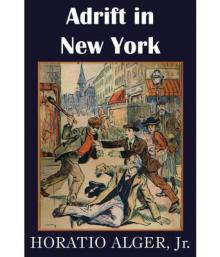 Adrift in New York: Tom and Florence Braving the World
Adrift in New York: Tom and Florence Braving the World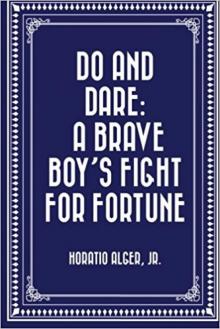 Do and Dare — a Brave Boy's Fight for Fortune
Do and Dare — a Brave Boy's Fight for Fortune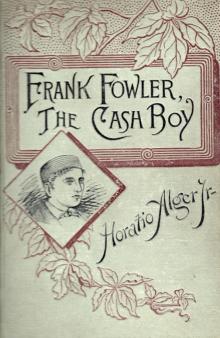 The Cash Boy
The Cash Boy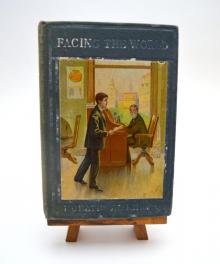 Facing the World
Facing the World The Young Explorer; Or, Claiming His Fortune
The Young Explorer; Or, Claiming His Fortune The Store Boy
The Store Boy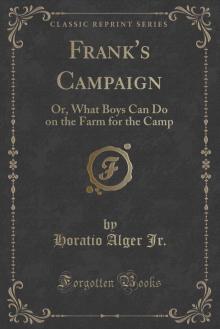 Frank's Campaign; Or, The Farm and the Camp
Frank's Campaign; Or, The Farm and the Camp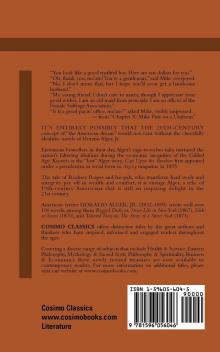 Cast Upon the Breakers
Cast Upon the Breakers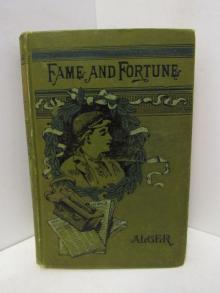 Fame and Fortune; or, The Progress of Richard Hunter
Fame and Fortune; or, The Progress of Richard Hunter The Errand Boy; Or, How Phil Brent Won Success
The Errand Boy; Or, How Phil Brent Won Success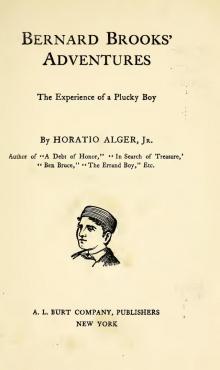 Bernard Brooks' Adventures: The Experience of a Plucky Boy
Bernard Brooks' Adventures: The Experience of a Plucky Boy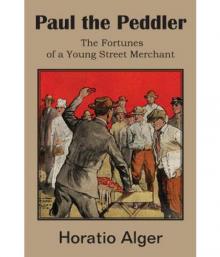 Paul the Peddler; Or, The Fortunes of a Young Street Merchant
Paul the Peddler; Or, The Fortunes of a Young Street Merchant Brave and Bold; Or, The Fortunes of Robert Rushton
Brave and Bold; Or, The Fortunes of Robert Rushton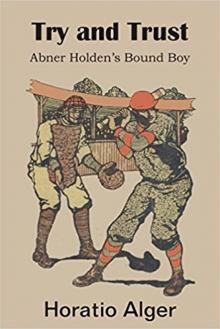 Try and Trust; Or, Abner Holden's Bound Boy
Try and Trust; Or, Abner Holden's Bound Boy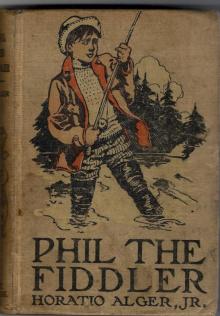 Phil, the Fiddler
Phil, the Fiddler In A New World; or, Among The Gold Fields Of Australia
In A New World; or, Among The Gold Fields Of Australia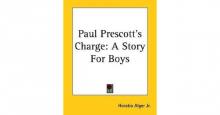 Paul Prescott's Charge
Paul Prescott's Charge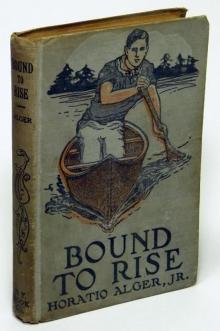 Joe's Luck; Or, Always Wide Awake
Joe's Luck; Or, Always Wide Awake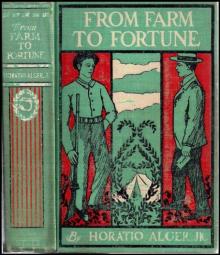 From Farm to Fortune; or, Nat Nason's Strange Experience
From Farm to Fortune; or, Nat Nason's Strange Experience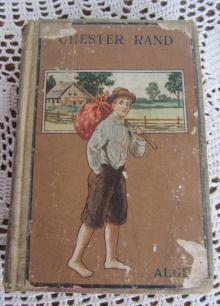 Chester Rand; or, The New Path to Fortune
Chester Rand; or, The New Path to Fortune Driven from Home; Or, Carl Crawford's Experience
Driven from Home; Or, Carl Crawford's Experience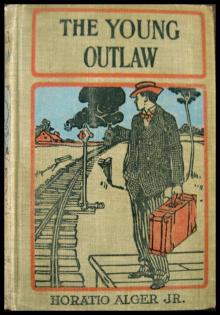 The Young Outlaw; or, Adrift in the Streets
The Young Outlaw; or, Adrift in the Streets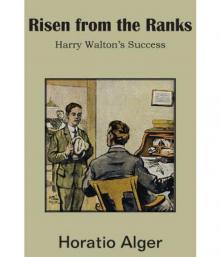 Risen from the Ranks; Or, Harry Walton's Success
Risen from the Ranks; Or, Harry Walton's Success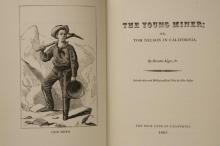 The Young Miner; Or, Tom Nelson in California
The Young Miner; Or, Tom Nelson in California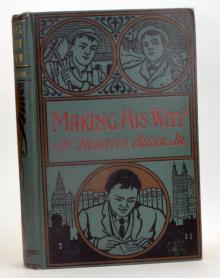 Making His Way; Or, Frank Courtney's Struggle Upward
Making His Way; Or, Frank Courtney's Struggle Upward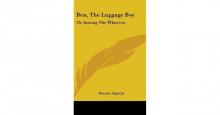 Ben, the Luggage Boy; Or, Among the Wharves
Ben, the Luggage Boy; Or, Among the Wharves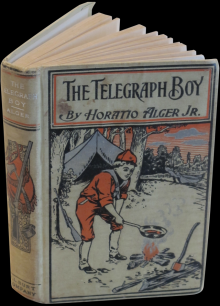 The Telegraph Boy
The Telegraph Boy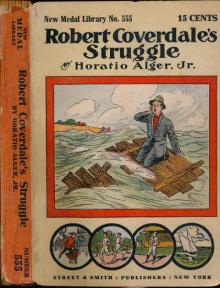 Robert Coverdale's Struggle; Or, on the Wave of Success
Robert Coverdale's Struggle; Or, on the Wave of Success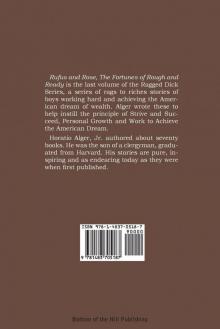 Rufus and Rose; Or, The Fortunes of Rough and Ready
Rufus and Rose; Or, The Fortunes of Rough and Ready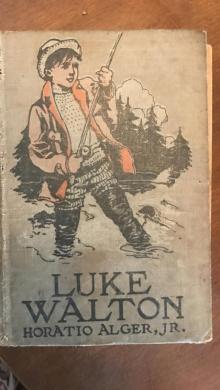 Luke Walton
Luke Walton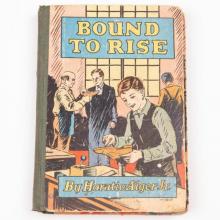 Mark Mason's Victory: The Trials and Triumphs of a Telegraph Boy
Mark Mason's Victory: The Trials and Triumphs of a Telegraph Boy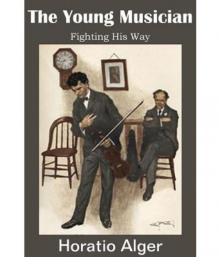 The Young Musician; Or, Fighting His Way
The Young Musician; Or, Fighting His Way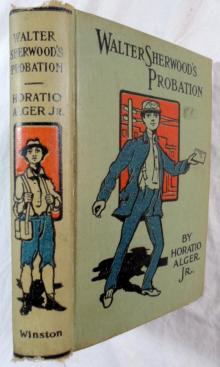 Walter Sherwood's Probation
Walter Sherwood's Probation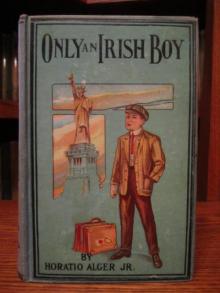 Only an Irish Boy; Or, Andy Burke's Fortunes
Only an Irish Boy; Or, Andy Burke's Fortunes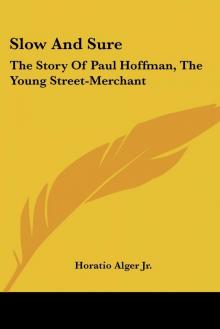 Slow and Sure: The Story of Paul Hoffman the Young Street-Merchant
Slow and Sure: The Story of Paul Hoffman the Young Street-Merchant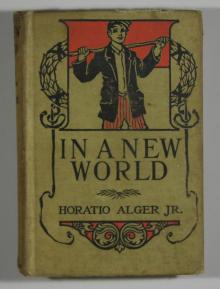 Herbert Carter's Legacy; Or, the Inventor's Son
Herbert Carter's Legacy; Or, the Inventor's Son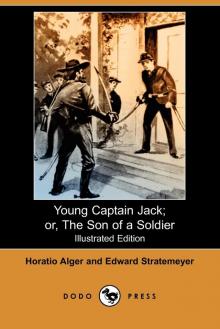 Young Captain Jack; Or, The Son of a Soldier
Young Captain Jack; Or, The Son of a Soldier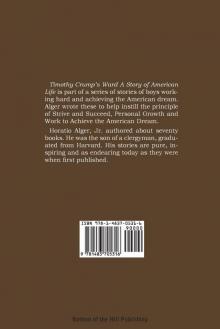 Timothy Crump's Ward: A Story of American Life
Timothy Crump's Ward: A Story of American Life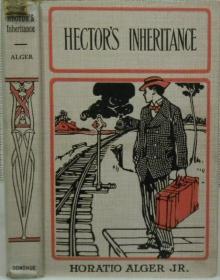 Hector's Inheritance, Or, the Boys of Smith Institute
Hector's Inheritance, Or, the Boys of Smith Institute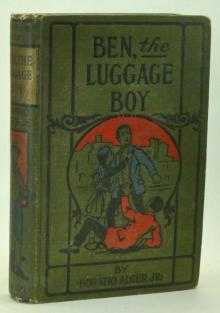 Ben's Nugget; Or, A Boy's Search For Fortune
Ben's Nugget; Or, A Boy's Search For Fortune